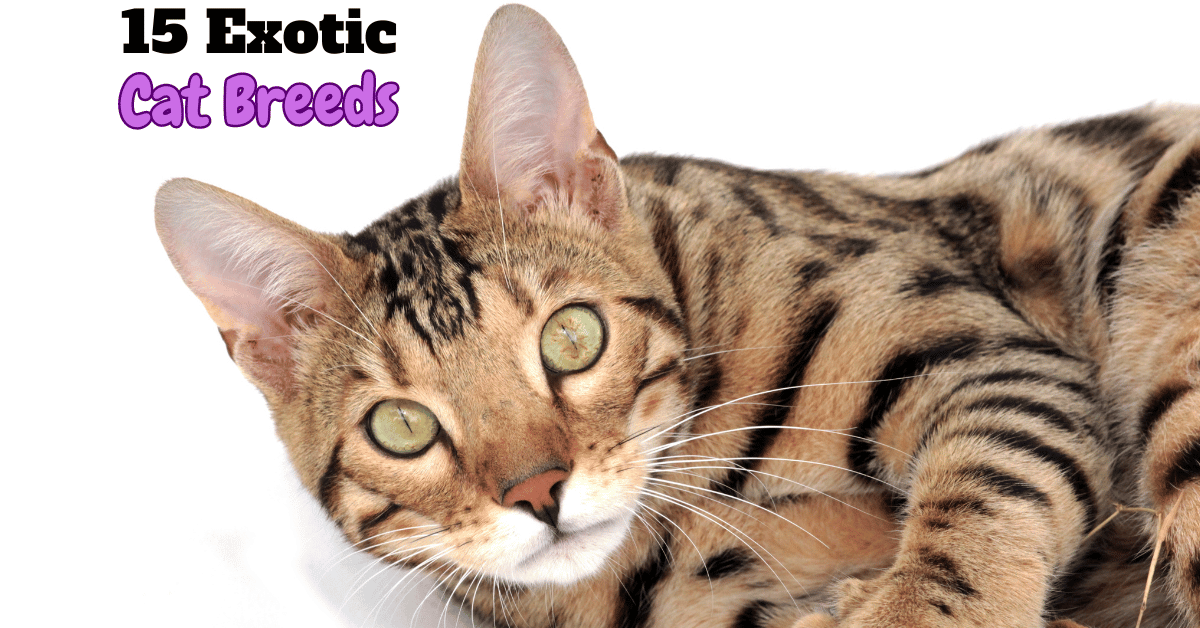Exotic Cat Breeds: Rising Stars in Unique Pet Ownership
Exotic cat breeds are gaining popularity among pet enthusiasts for their striking looks and fascinating personalities. These cats, which often resemble their wild cousins, are a captivating choice for those looking for a unique companion.
However, owning an exotic cat comes with responsibilities that go beyond those of a typical house cat. From legal considerations to special care requirements, it’s important to be well-informed before bringing one of these majestic creatures into your home.
Reminder: Always verify ownership laws before adopting these unique felines, as regulations vary and may change frequently.
15 Exotic Cat Breeds That Make Captivating Companions
1. Bengal Cat: The Leopard Look-Alike
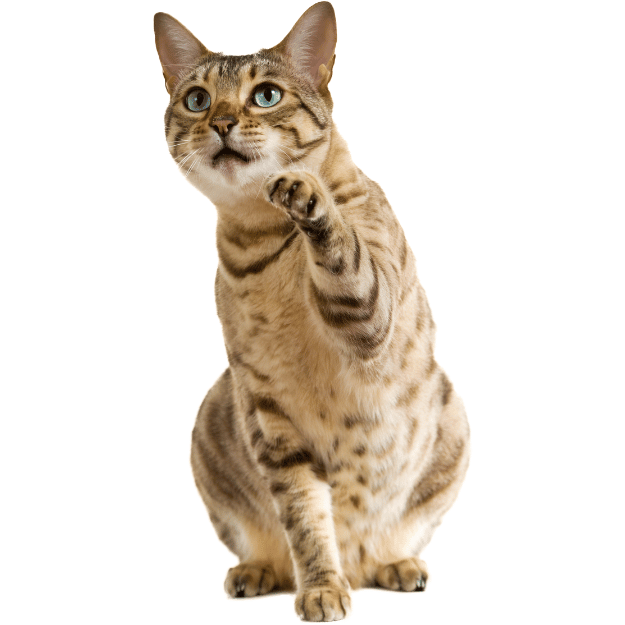
Bengals are the ultimate choice for those who want a piece of the wild without leaving their living room. With their sleek coat patterned like a leopard, Bengals are pure energy wrapped in a beautiful feline package.
Originating from the United States, these cats have a sleek, athletic build with striking rosettes that make them look like a miniature leopard. Bengals are high-energy, playful, and extremely curious.
They are always up for an adventure, finding ways to keep themselves entertained even when you’re not around. To keep a Bengal happy, you need to provide plenty of interactive playtime. Think puzzle toys, laser pointers, and sessions that mimic hunting.
2. Savannah Cat: The Cheetah Companion
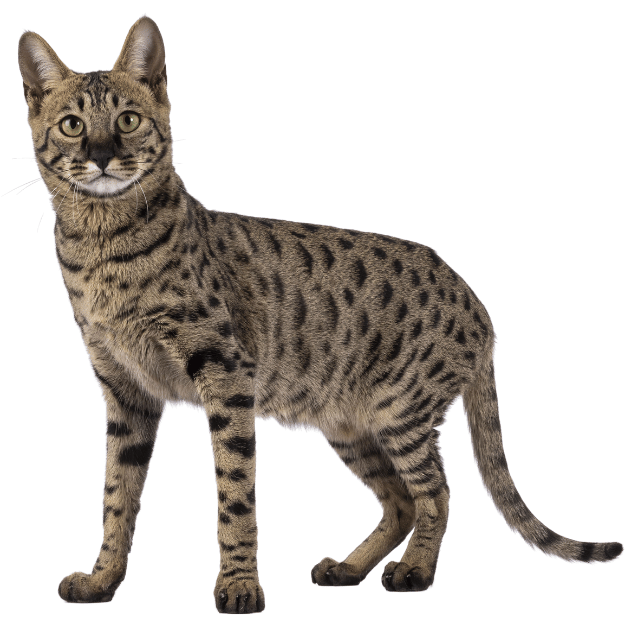
If you’ve ever dreamed of having a pet that looks like it just stepped off the African savanna, the Savannah cat might be your ideal match. These striking felines, originally bred in the United States, boast a tall, elegant frame with cheetah-like spots.
The Savannah is intelligent, fiercely loyal, and a bit on the wild side, known for forming deep, dog-like bonds with their humans. But these cats need space—lots of it—to really thrive. They’re adventurous explorers who need both mental and physical stimulation, so they aren’t the best match for small apartments.
If you can provide a spacious home with plenty of climbing spots and vertical challenges, a Savannah will reward you with affection and loyalty.
3. Chausie: The Jungle Cat Hybrid
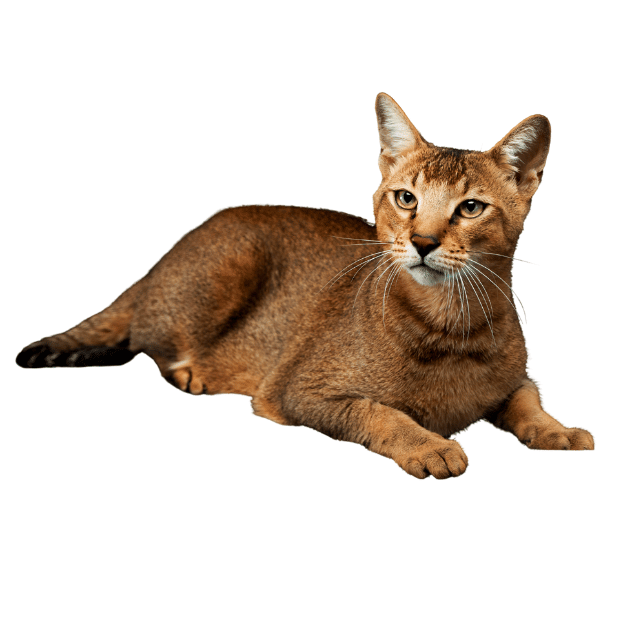
Chausies are for those who appreciate a bold feline with a hint of jungle wildness. This breed, which originates from Egypt, is an impressive mix of domestic and wild ancestry.
With their muscular, athletic build and fierce wild expression, Chausies have the look of a cat that means business. They are independent but love bonding with the people they trust, and they thrive on interaction. However, Chausies also value their freedom, and they’re happiest when they have access to outdoor enclosures or a safe catio where they can feel the wind in their fur.
4. Toyger: The Miniature Tiger
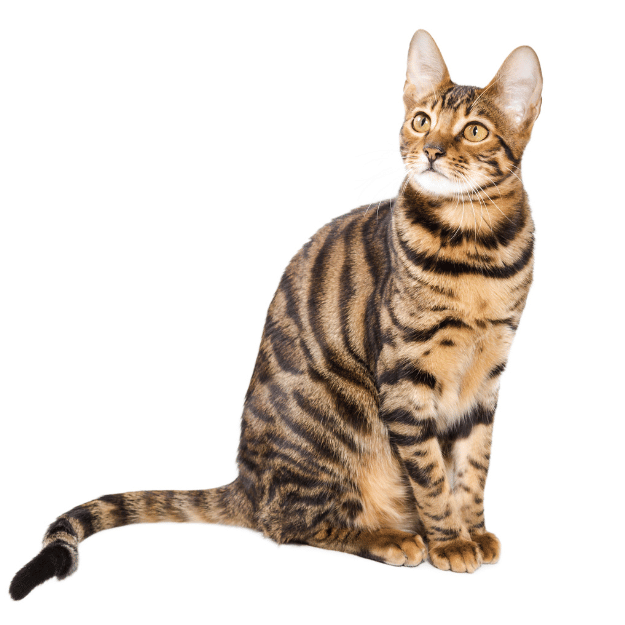
Designed to bring the essence of a tiger into a manageable house cat, Toygers are as striking as they are sociable. Bred in the United States, Toygers have distinctive orange fur with bold black stripes that make them look just like tiny tigers.
But unlike a real tiger, Toygers are gentle, sociable, and often easy to train. They’re well-suited for families, doing well with children and other pets. If you’re looking for an exotic look without the intense demands of a hybrid cat, Toygers make an excellent choice.
5. Ocicat: The Spotted Beauty
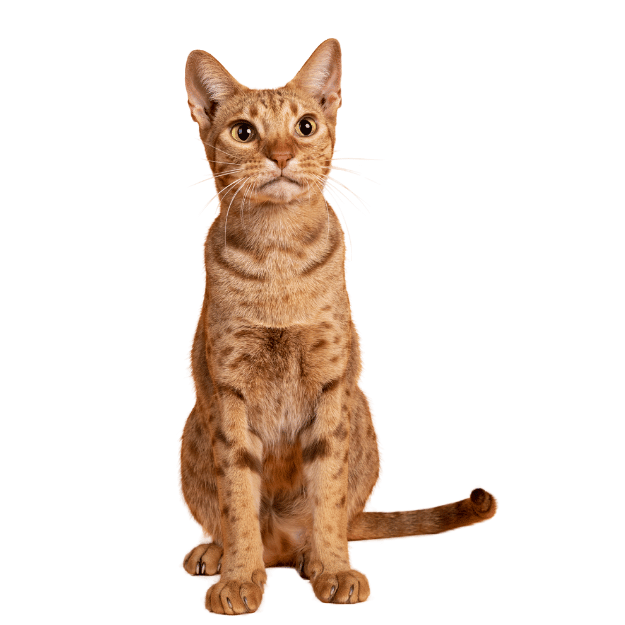
Inspired by the wild ocelot, the Ocicat brings a wild look into the home but with all the comfort of a domesticated cat. Originating in the United States, these cats have a sleek coat covered in distinctive spots that give them an exotic charm.
Ocicats are friendly, adaptable, and thrive on play—especially if kids are involved. They’re highly social and love being part of an active household. With a short coat that’s easy to maintain, grooming isn’t a huge chore, but a little attention keeps them looking their best. If you’re someone who loves having a cat that’s always eager to join in whatever you’re doing, the Ocicat won’t disappoint.
6. Egyptian Mau: The Speedy Hunter
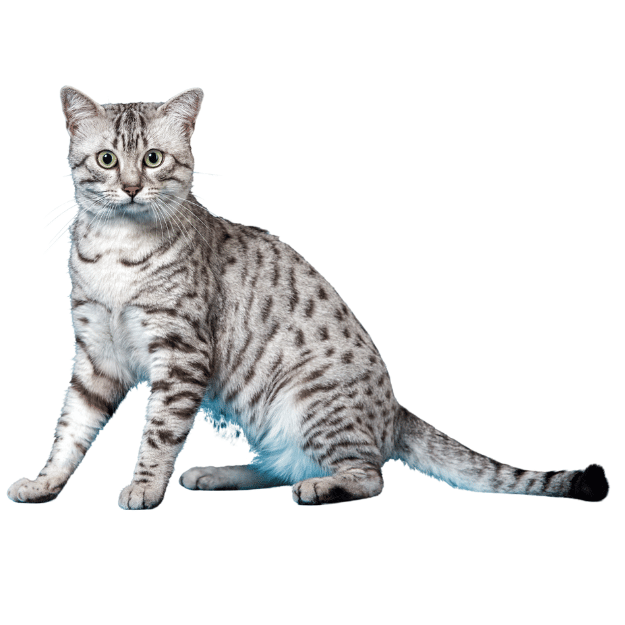
Known for their incredible agility, Egyptian Maus are natural-born hunters and are the only domestic breed with naturally occurring spots. Originally from Egypt, these cats have an effortlessly exotic look, complete with a spotted coat that makes them stand out.
They’re athletic, vocal, and fiercely loyal, though they can be a little reserved around strangers. With their families, they’re loving and playful. And did we mention they’re fast?
Egyptian Maus can reach speeds of up to 30 mph, making them the fastest domestic cat breed. If you want a cat that brings energy, speed, and a unique look into your home, the Egyptian Mau is a great choice.
7. Caracat: The Majestic Hybrid
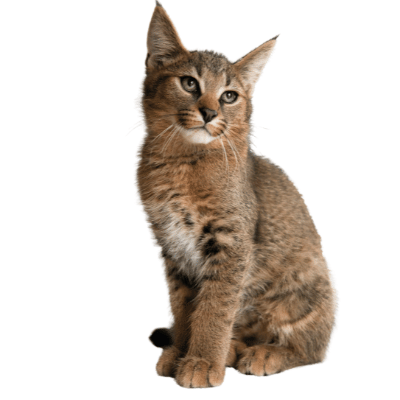
The Caracat is a true showstopper—a hybrid between a Caracal and a domestic cat. They have the striking wild look of a Caracal, complete with tall, tufted ears, but a touch of domesticity that makes them a more approachable companion. Their origins as a hybrid make them a challenge, suited for experienced owners who understand their independent and territorial nature.
They thrive best with patient, consistent handling. Due to their hybrid nature, owning a Caracat may come with legal restrictions, so always check your local regulations. If you’re ready for a cat that’s equal parts wild and majestic, the Caracat will keep you on your toes.
8. Serengeti Cat: The Graceful Stalker
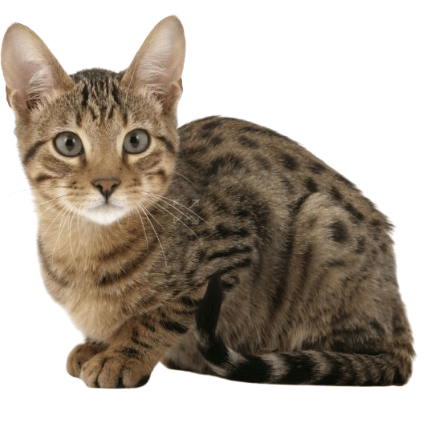
The Serengeti Cat, with its long legs and large ears, is reminiscent of wild servals but is entirely domestic. Developed in the United States, these cats have a sleek, spotted coat and an unmistakable wild-cat vibe.
Serengetis are confident, curious, and highly social, and they love to interact with their humans. These cats aren’t shy about making their needs known, and they require plenty of vertical space—think shelves, tall cat trees, and climbing opportunities.
9. Pixie-Bob: The Bobcat Doppelgänger
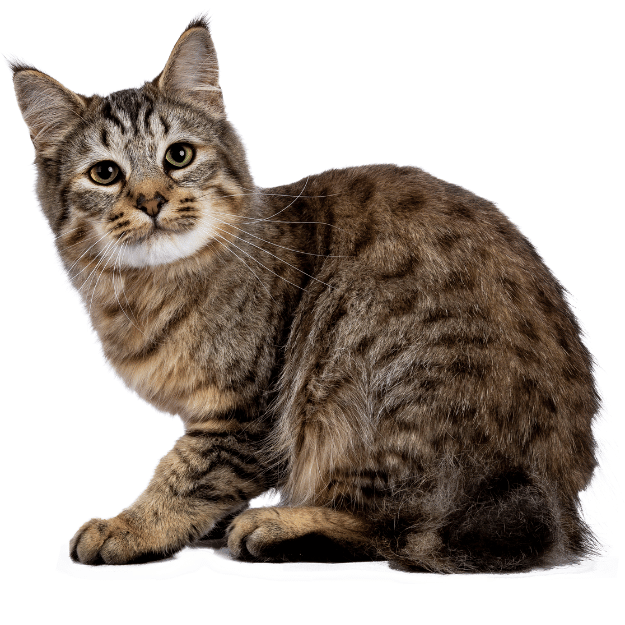
The Pixie-Bob is one of those rare breeds that looks like it stepped right out of the forest. With a bobbed tail, muscular build, and tufted ears, they have all the charm of a miniature bobcat, yet they are entirely domesticated.
Pixie-Bobs originated in the United States, and their loyal, dog-like nature makes them stand out. They love being part of a family and tend to form strong bonds with their humans. While they can be a bit aloof with strangers, they’re incredibly affectionate once they get comfortable. These cats enjoy outdoor time and are great candidates for harness training.
10. Abyssinian Cat: The Playful Explorer
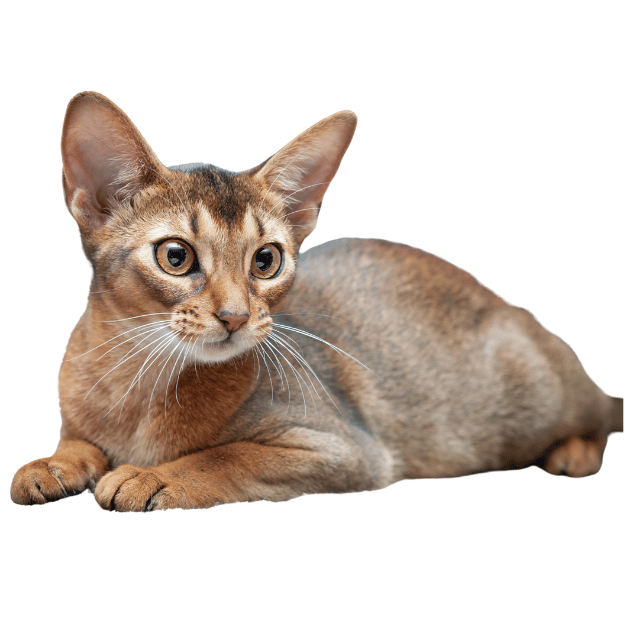
The Abyssinian cat is one of the oldest known cat breeds, known for its sleek, muscular body and unique ticked coat that gives it a wild, exotic appearance. These cats are believed to have originated from the regions around Egypt, adding an extra layer of mystique to their history.
Abyssinians are highly active, curious, and always up for an adventure. They love to climb, explore, and be a part of whatever you’re doing. Abyssinians are often described as “clowns” of the cat world due to their playful antics and endless energy. They are incredibly affectionate and love being involved in family activities.
11. Geoffroy’s Cat: The Little Wild One
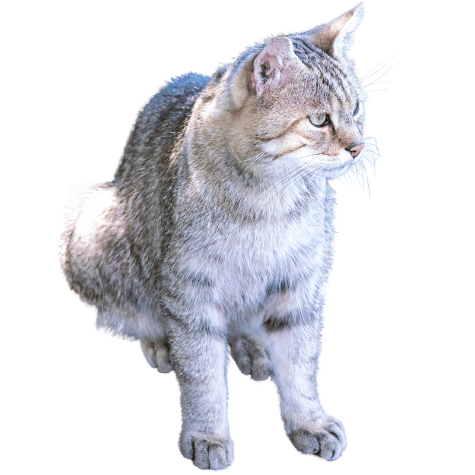
Geoffroy’s Cat is another wild cat that has captured the hearts of exotic pet enthusiasts. Originating from South America, these small cats have a sandy or grey coat covered in dark spots, giving them a truly wild appearance.
Geoffroy’s Cats are known for their solitary nature and don’t usually crave the kind of attention that domestic cats do. They need specialized care and enclosures, and they are not recommended for beginner pet owners. If you’re drawn to the idea of owning a wild cat and are ready for the commitment, Geoffroy’s Cat can be a fascinating companion.
12. Cheetoh Cat: The Super Hybrid
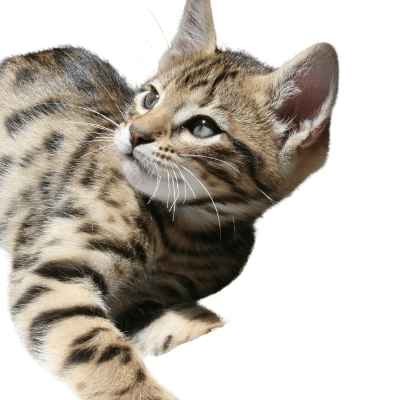
The Cheetoh is a fascinating hybrid breed created from a mix of Bengal and Ocicat, giving them a unique combination of rosettes and stripes. These cats, bred in the United States, are one of the largest domestic cat breeds, with a gentle, friendly personality to match their impressive size.
Cheetohs are curious by nature and love interacting with their families. They thrive in a busy household where there’s always something to do, whether it’s playing with toys, climbing, or just exploring their surroundings.
13. Peterbald: The Sleek and Sophisticated
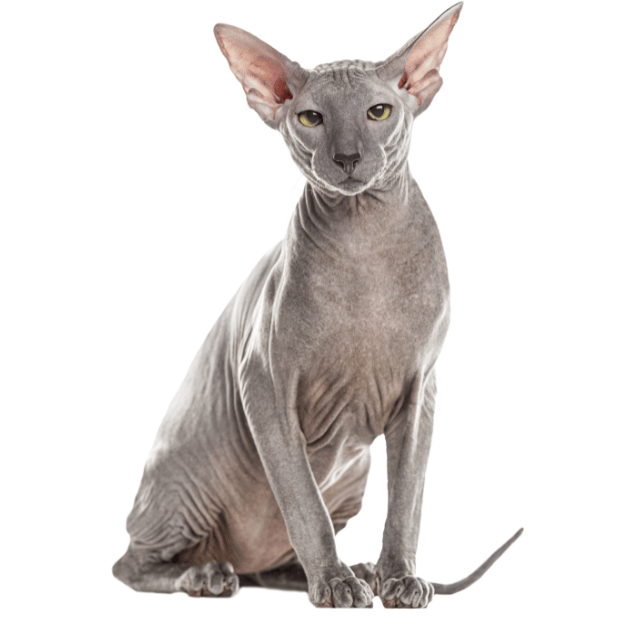
The Peterbald cat is one of the more recent additions to the exotic breed scene, originating in Russia in the 1990s. With their sleek, almost hairless bodies and striking, elongated features, Peterbalds have an elegant, sophisticated appearance that sets them apart. Their coats can vary from completely bald to having a fine, peach-fuzz-like covering, and some even have short, velvety fur.
Their unique coat (or lack thereof) does come with some special care requirements. Peterbalds are prone to getting cold, so they appreciate warm spots around the house or even cozy sweaters to keep them comfortable. Their nearly hairless skin also means they need regular bathing to remove oil buildup, as they lack the fur that usually absorbs it.
14. Sokoke: The Rare African Cat
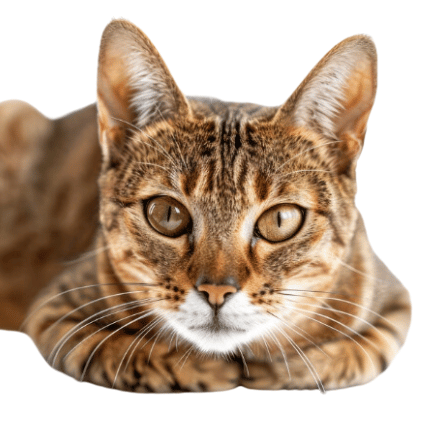
The Sokoke is one of the rarest cat breeds, originating from the Arabuko Sokoke Forest in Kenya. With a tabby pattern that’s marbled in a unique way, Sokokes stand out visually while also being relatively low maintenance.
They are social cats that do well with children and other pets, making them great for families. Sokokes are naturally occurring, meaning they’ve had minimal human intervention in their development. They are playful, enjoy climbing, and love a good interaction with their human companions.
15. Fishing Cat Hybrid: The Water Lover
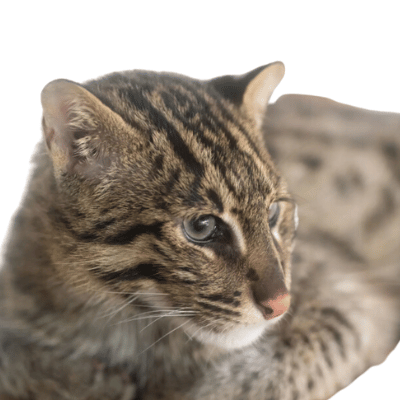
The Fishing Cat Hybrid, as its name suggests, has a strong affinity for water, a trait inherited from its wild Fishing Cat ancestor. Native to South Asia, these hybrids have a stocky build, spotted coat, and even webbed feet that make them excellent swimmers.
Fishing Cat Hybrids are fascinated by water and will happily play in shallow pools or even your bathtub. They are not your typical lap cat and retain strong predatory instincts, requiring plenty of stimulation to stay content. If you’re an experienced owner with the means to provide a water-rich environment, this unique feline will reward you with its lively and adventurous spirit.
Understanding Exotic Cat Breeds: What to Know Before Adopting
Owning an exotic cat is a unique and rewarding experience, but it requires careful consideration and preparation. These cats often have special needs that differ from the average domestic feline.
Exotic cats may require species-appropriate diets that include high protein and specific nutrients. Consulting a veterinarian with experience in exotic pets is crucial to ensure they are getting the proper nutrition.
Unlike a standard house cat who might be happy with a window perch and a cozy cat bed, exotic cats need more space to roam. They love a stimulating environment that lets them express their natural instincts. Providing ample space, preferably with access to a secure outdoor enclosure or catio, is essential for their well-being.
Many exotic breeds are highly intelligent and require mental stimulation to stay happy. Puzzle toys, climbing structures, and interactive play can help fulfill their natural instincts. Without proper stimulation, these active cats may become bored and potentially destructive.
Legalities of Owning Exotic Cats: Play It Safe
The ownership of exotic cats is subject to various regulations, which differ from state to state and country to country. Before adopting an exotic cat, it’s essential to check local, state, and federal laws to ensure that ownership is allowed in your area. Some breeds may require special permits, while others may be restricted entirely.
Organizations like Big Cat Rescue or breed-specific associations are great resources for understanding the legal requirements involved in owning exotic cats. These organizations often provide updated information on what permits are needed, as well as the responsibilities that come with owning such unique pets.
FAQs About Exotic Cat Breeds
1. Are Exotic Cats Good with Families?
While some exotic cats can adapt well to family life, many are better suited for adults or families with older children due to their high energy and specific needs. It’s essential to consider the breed’s temperament and compatibility with children before bringing an exotic cat into a home.
2. What is the Cost of Owning an Exotic Cat?
Exotic cats can be expensive to purchase, and their upkeep is often costlier due to special diets, larger enclosures, and veterinary care. Potential owners should be prepared for higher costs, including the possibility of needing specialized vet care.
3. Where Can I Find a Reputable Breeder?
Finding a reputable breeder is critical when considering an exotic cat. Look for breeders who are transparent, provide health records, and have a good reputation within the exotic cat community. Responsible breeders should prioritize the well-being of their animals over profit.
Choosing an Exotic Cat: A Lifelong Commitment
Adopting an exotic cat is a serious, long-term commitment that requires research, preparation, and dedication. These unique cats have specialized needs that must be met to ensure they lead happy and healthy lives.
Potential owners should carefully evaluate their ability to provide the care, space, and attention that these captivating companions deserve. Exotic cats are stunning and fascinating, but they need an owner who is ready to meet their unique needs and embrace the responsibility that comes with these incredible animals.
At Sweet Purrfections, we strongly suggest that instead of buying cat breeds, you consider adopting from shelters. There are countless loving cats waiting for a forever home, and they deserve a happy life just as much as any other cat.

